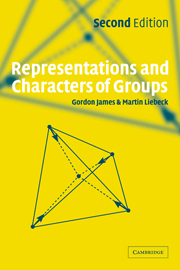Book contents
- Frontmatter
- Contents
- Preface
- 1 Groups and homorphisms
- 2 Vector spaces and linear transformations
- 3 Group representations
- 4 FG-modules
- 5 FG-submodules and reducibility
- 6 Group algebras
- 7 FG-homomorphisms
- 8 Maschke's Theorem
- 9 Schur's Lemma
- 10 Irreducible modules and the group algebra
- 11 More on the group algebra
- 12 Conjugacy classes
- 13 Characters
- 14 Inner products of characters
- 15 The number of irreducible characters
- 16 Character tables and orthogonality relations
- 17 Normal subgroups and lifted characters
- 18 Some elementary character tables
- 19 Tensor products
- 20 Restriction to a subgroup
- 21 Induced modules and characters
- 22 Algebraic integers
- 23 Real representations
- 24 Summary of properties of character tables
- 25 Characters of groups of order pq
- 26 Characters of some p-groups
- 27 Character table of the simple group of order 168
- 28 Character table of GL(2, q)
- 29 Permutations and characters
- 30 Applications to group theory
- 31 Burnside's Theorem
- 32 An application of representation theory to molecular vibration
- Solutions to exercises
- Bibligraphy
- Index
23 - Real representations
Published online by Cambridge University Press: 05 June 2012
- Frontmatter
- Contents
- Preface
- 1 Groups and homorphisms
- 2 Vector spaces and linear transformations
- 3 Group representations
- 4 FG-modules
- 5 FG-submodules and reducibility
- 6 Group algebras
- 7 FG-homomorphisms
- 8 Maschke's Theorem
- 9 Schur's Lemma
- 10 Irreducible modules and the group algebra
- 11 More on the group algebra
- 12 Conjugacy classes
- 13 Characters
- 14 Inner products of characters
- 15 The number of irreducible characters
- 16 Character tables and orthogonality relations
- 17 Normal subgroups and lifted characters
- 18 Some elementary character tables
- 19 Tensor products
- 20 Restriction to a subgroup
- 21 Induced modules and characters
- 22 Algebraic integers
- 23 Real representations
- 24 Summary of properties of character tables
- 25 Characters of groups of order pq
- 26 Characters of some p-groups
- 27 Character table of the simple group of order 168
- 28 Character table of GL(2, q)
- 29 Permutations and characters
- 30 Applications to group theory
- 31 Burnside's Theorem
- 32 An application of representation theory to molecular vibration
- Solutions to exercises
- Bibligraphy
- Index
Summary
Since Chapter 9, we have always taken our representations to be over the field ℂ of complex numbers. However, some results in representation theory work equally well for the field ℝ of real numbers. There is a subtle interplay between representations over ℂ and representations over ℝ, which we shall explore in this chapter.
Often, characters of ℂG-modules are real-valued, and the first main result of the chapter describes the number of real-valued irreducible characters of G.
Let ρ be a representation of G. If all the matrices gρ (g ∈ G) have real entries, then of course the character of ρ is real-valued. However, the converse is not true: it can happen that the character of ρ is real-valued while there is no representation σ equivalent to ρ with all the matrices gσ having real entries. Various criteria for whether or not a character corresponds to a representation over ℝ lead us to the remarkable Frobenius–Schur Count of Involutions. This is used in the last section to prove a famous result of Brauer and Fowler concerning centralizers of involutions in finite simple groups.
The material in this chapter is perhaps at a slightly more advanced level than that in the rest of the book, and is not used in the ensuing chapters, which consist largely of the calculation of character tables and applications of character theory. Nevertheless, the subject of real representations not only is elegant and interesting, but also gives delicate information about characters which often comes into play in more difficult calculations.
Information
- Type
- Chapter
- Information
- Representations and Characters of Groups , pp. 263 - 282Publisher: Cambridge University PressPrint publication year: 2001
